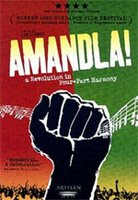 Amandla in Xhosa means power. This word was repeatedly uttered, screamed and sung throughout the documentary called Amandla! A Revolution in Four-Part Harmony directed by Lee Hirsch. This documentary won the Audience Award and Freedom of Expression Award at the 2002 Sundance Film Festival.
Amandla in Xhosa means power. This word was repeatedly uttered, screamed and sung throughout the documentary called Amandla! A Revolution in Four-Part Harmony directed by Lee Hirsch. This documentary won the Audience Award and Freedom of Expression Award at the 2002 Sundance Film Festival.Amandla reveals the inside stories of the long-hauled struggle of black South Africans against apartheid through the powerful songs of freedom, which managed to strengthen the spirit of black South Africans for more than 40 years.
The film's overture is a series of flashbacks depicting crowds of black South Africans demonstrating on the streets with nothing but their God gifted voices as their ultimate weapons. On every corner of the street, penetrating and overwhelming songs of freedom swelling up like cloudbursts, calling for an end to apartheid.
At a private screening of this documentary organized by Amnesty International Malaysia, my heart began throbbing and brewing with anger and felt like I could easily join the demonstrators and sing my anger away with my fists in the air.
The documentary moves on to highlight the story of an amazing unsung hero named Vuyisile Mini, an activist cum songwriter, not to mention an outspoken political leader, who used music to inspire the people to challenge the apartheid government that came to power in 1948, stripping black South Africans of their basic rights as citizens.
One of his songs called "Beware Verwoerd", carrying Xhosa lyrics, which warn the Father of apartheid, Hendrik Verwoerd that his judgement day will come.Tragically, Vuyisile Mini was found "guilty" of 17 counts of sabotage and the murder of a police informer. He was executed in Pretoria Central Prison on November 8, 1964.
The documentary goes on to feature a series of interviews with celebrated musicians, who helped to reveal the suffering of black South Africans to the world. Those musical heroes and heroines appearing in the documentary are trumpeter Hugh Masekela, pianist Abdullah Ibrahim, singer Miriam Makeba, singer / songwriter Vusi Mahlasela and singer Sibongile Khumalo.
On screen they tell inspiring stories sure to ignite the fighting spirit of even the meekest of lambs to rise up against injustice. Some of them infuse their stories with imotional vocals. In the crowd, I noticed a few viewers wiping away tears. Thank goodness, I was not the only one.
There is one particularly poignant scene in the documentary, shot in black and white, showing a black South African woman with a baby in her arms, waiting for a bus. A vacant bus halts before her eyes but she doesn't get on. The bus leaves. Then, there is a pause after the scenario to give the viewers enough time to hold their breath and ask why the woman reacted this way. Then the camera zooms in to a sign on the bus: "For the Whites only."
Amandla also features a shocking montage of achival footage of rallies, funerals, guerilla camps, church services, demonstrations, marches and the brutality of the apartheid government. On of the most moving parts comes when a black South African sings in distress: " Our only sin is to be black" .
Yet another heartbreaking refrain, in reference to Nelson Mandela's jail term, is delivered by Vusi Mahlasela in his soaring and plantive voice, " When you come back".
Yes, Nelson Mandela did come back and was elected as South Africa's first democratically chosen president in 1994. So, the film's ending is hardly sorrowful because the voices of the oppressed have finally drowned out the cries of racism from the aparteid government. Amandla is a truimph of both cinema and African music.


